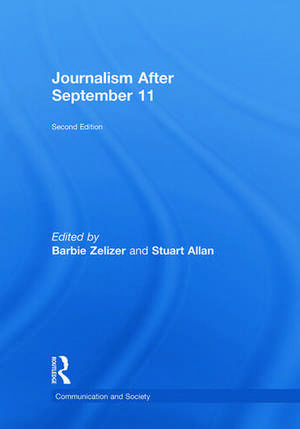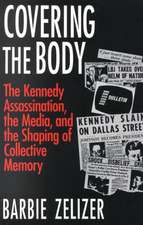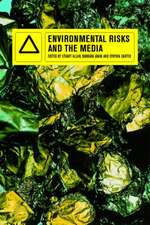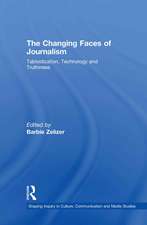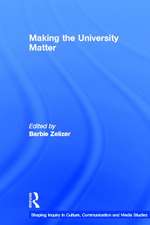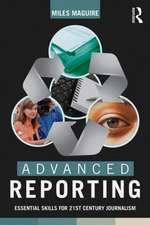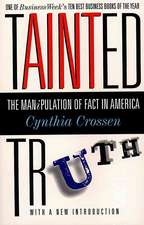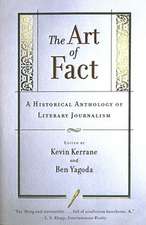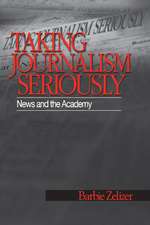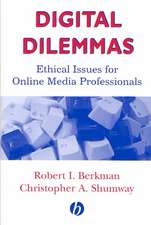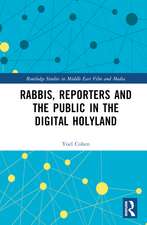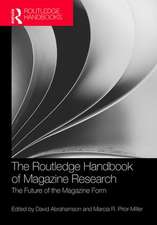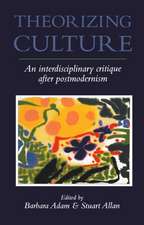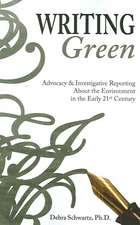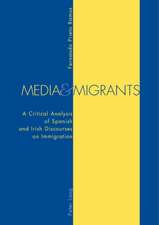Journalism After September 11: Communication and Society
Editat de Barbie Zelizer, Stuart Allanen Limba Engleză Hardback – 21 apr 2011
This collection of essays comes mainly from academics but nobody should bridle at theorists lecturing practitioners. They properly challenge the way September 11th was reported - in a way that's both an endorsement of the role of the media and a wake-up call on its failures . . . anyone interested in our trade should read it.' - Roger Mosey, Ariel
'A thoughtful and engaging examination of the effects of 9/11 on the field of journalism. Its unique aim is to discuss the impact of the attack as a personal trauma and its current and future effects on journalism and the reporting of the news. . . highly recommended.' - Library Journal
Journalism After September 11 examines how the traumatic attacks of that day continue to transform the nature of journalism, particularly in the United States and Britain. Familiar notions of what it means to be a journalist, how best to practice journalism, and what the public can reasonably expect of journalists in the name of democracy, were shaken to their foundations.
Ten years on, however, new questions arise regarding the lasting implications of that tragic day and its aftermath.
Bringing together an internationally respected collection of scholars and media commentators, Journalism After September 11 addresses topics such as: journalism and public life at a time of crisis; broadsheet and tabloid newspaper coverage of the attacks; the role of sources in shaping the news; reporting by global news media such as CNN; Western representations of Islam; current affairs broadcasting; news photography and trauma; the emotional well-being of reporters; online journalism; as well as a host of pertinent issues around news, democracy and citizenship.
This second edition includes four new chapters – examining Arabic newspaper reporting of the attacks, the perceptions of television audiences, national magazine coverage of the ensuing crisis, and the media politics of ‘othering’ – as well as revised chapters from the first edition and an updated Introduction by the co-editors. A foreword is provided by Victor Navasky and an afterword by Phillip Knightley.
| Toate formatele și edițiile | Preț | Express |
|---|---|---|
| Paperback (1) | 358.69 lei 43-57 zile | |
| Taylor & Francis – 21 apr 2011 | 358.69 lei 43-57 zile | |
| Hardback (1) | 766.85 lei 43-57 zile | |
| Taylor & Francis – 21 apr 2011 | 766.85 lei 43-57 zile |
Din seria Communication and Society
-
 Preț: 231.41 lei
Preț: 231.41 lei -
 Preț: 188.17 lei
Preț: 188.17 lei -
 Preț: 274.60 lei
Preț: 274.60 lei -
 Preț: 279.88 lei
Preț: 279.88 lei -
 Preț: 280.51 lei
Preț: 280.51 lei -
 Preț: 353.35 lei
Preț: 353.35 lei -
 Preț: 351.73 lei
Preț: 351.73 lei - 26%
 Preț: 765.43 lei
Preț: 765.43 lei -
 Preț: 348.88 lei
Preț: 348.88 lei - 18%
 Preț: 1000.27 lei
Preț: 1000.27 lei - 34%
 Preț: 794.55 lei
Preț: 794.55 lei - 18%
 Preț: 1000.27 lei
Preț: 1000.27 lei -
 Preț: 238.77 lei
Preț: 238.77 lei -
 Preț: 349.47 lei
Preț: 349.47 lei - 27%
 Preț: 241.16 lei
Preț: 241.16 lei - 18%
 Preț: 1106.81 lei
Preț: 1106.81 lei - 34%
 Preț: 841.32 lei
Preț: 841.32 lei - 26%
 Preț: 765.23 lei
Preț: 765.23 lei - 18%
 Preț: 1011.64 lei
Preț: 1011.64 lei -
 Preț: 352.33 lei
Preț: 352.33 lei - 19%
 Preț: 493.12 lei
Preț: 493.12 lei - 18%
 Preț: 1001.84 lei
Preț: 1001.84 lei -
 Preț: 358.69 lei
Preț: 358.69 lei - 12%
 Preț: 112.02 lei
Preț: 112.02 lei - 18%
 Preț: 1002.63 lei
Preț: 1002.63 lei - 18%
 Preț: 1004.24 lei
Preț: 1004.24 lei -
 Preț: 354.78 lei
Preț: 354.78 lei - 18%
 Preț: 1003.99 lei
Preț: 1003.99 lei - 23%
 Preț: 698.27 lei
Preț: 698.27 lei -
 Preț: 352.33 lei
Preț: 352.33 lei - 34%
 Preț: 500.69 lei
Preț: 500.69 lei - 9%
 Preț: 121.75 lei
Preț: 121.75 lei -
 Preț: 352.33 lei
Preț: 352.33 lei -
 Preț: 395.93 lei
Preț: 395.93 lei - 30%
 Preț: 597.18 lei
Preț: 597.18 lei - 13%
 Preț: 94.12 lei
Preț: 94.12 lei - 26%
 Preț: 766.12 lei
Preț: 766.12 lei - 22%
 Preț: 521.44 lei
Preț: 521.44 lei - 18%
 Preț: 1003.93 lei
Preț: 1003.93 lei - 24%
 Preț: 165.77 lei
Preț: 165.77 lei -
 Preț: 347.72 lei
Preț: 347.72 lei - 27%
 Preț: 242.31 lei
Preț: 242.31 lei
Preț: 766.85 lei
Preț vechi: 1104.33 lei
-31% Nou
Puncte Express: 1150
Preț estimativ în valută:
146.73€ • 153.62$ • 121.41£
146.73€ • 153.62$ • 121.41£
Carte tipărită la comandă
Livrare economică 07-21 aprilie
Preluare comenzi: 021 569.72.76
Specificații
ISBN-13: 9780415460149
ISBN-10: 041546014X
Pagini: 368
Ilustrații: 2 tables, 3 halftones and 1 line drawing
Dimensiuni: 156 x 234 mm
Greutate: 0.6 kg
Ediția:2Revizuită
Editura: Taylor & Francis
Colecția Routledge
Seria Communication and Society
Locul publicării:Oxford, United Kingdom
ISBN-10: 041546014X
Pagini: 368
Ilustrații: 2 tables, 3 halftones and 1 line drawing
Dimensiuni: 156 x 234 mm
Greutate: 0.6 kg
Ediția:2Revizuită
Editura: Taylor & Francis
Colecția Routledge
Seria Communication and Society
Locul publicării:Oxford, United Kingdom
Public țintă
General, Postgraduate, Professional, and UndergraduateCuprins
@Contents: Selected Contents: Foreword Victor Navasky Introduction When Trauma Shapes The News Barbie Zelizer and Stuart Allan PART I. The trauma of September 11 Chapter 1. September 11 In the mind of American Journalism Jay Rosen Chapter 2. What’s unusual about covering politics as usual Michael Schudson Chapter 3. Photography, journalism, and trauma Barbie Zelizer Chaper 4. Mediating Catastrophe: September 11 and the crisis of the other Roger Silverstone PART II. News and its contexts Chapter 5. American journalism on, before, and after September 11 James W. Carey Chapter 6. September 11 and the structural limitations of US journalism Robert W. McChesney Chapter 7. "Our duty to history": newsmagazines and the national voice Carolyn Kitch Chapter 8. Covering Muslims: journalism as cultural practice Karim H. Karim Chapter 9. "Why do they hate us?": seeking answers in the pan-Arab news coverage of 9/11 Noha Mellor PART III The changing boundaries of journalism Chapter 10. Reweaving the Internet: online news of September 11 Stuart Allan Chapter11. Converging into irrelevance? Supermarket tabloids in the post-9/11 world S. Elizabeth Bird Chapter 12. Media fundamentalism: the immediate response of the UK national press to terrorism – from 9/11 to 7/7 Michael Bromley and Stephen Cushion Chapter 13. Television agora and agoraphobia post-September 11 Simon Cottle Chapter 14. "Our Ground Zeros": diaspora, media and memory Marie Gillespie PART IV Reporting trauma tomorrow Chapter 15. Journalism, risk, and patriotism Silvio Waisbord Chapter 16. Trauma talk: reconfiguring the inside and outside Annabelle Sreberny Chapter 17. Journalism and political crises in the global network society Ingrid Volkmer Chapter 18. Reporting under fire: the physical safety and emotional welfare of journalists Howard Tumber Afterword Phillip Knightley
Recenzii
Praise for the first edition:
This collection of essays comes mainly from academics but nobody should bridle at theorists lecturing practitioners. They properly challenge the way September 11th was reported - in a way that's both an endorsement of the role of the media and a wake-up call on its failures . . . anyone interested in our trade should read it.' - Roger Mosey, Ariel
'A thoughtful and engaging examination of the effects of 9/11 on the field of journalism. Its unique aim is to discuss the impact of the attack as a personal trauma and its current and future effects on journalism and the reporting of the news. . . highly recommended.' - Library Journal
This collection of essays comes mainly from academics but nobody should bridle at theorists lecturing practitioners. They properly challenge the way September 11th was reported - in a way that's both an endorsement of the role of the media and a wake-up call on its failures . . . anyone interested in our trade should read it.' - Roger Mosey, Ariel
'A thoughtful and engaging examination of the effects of 9/11 on the field of journalism. Its unique aim is to discuss the impact of the attack as a personal trauma and its current and future effects on journalism and the reporting of the news. . . highly recommended.' - Library Journal
Notă biografică
Barbie Zelizer is Professor of Communication and holds the Raymond Williams Chair of Communication at the Annenberg School of Communication, University of Pennsylvania.
Stuart Allan is Professor of Journalism in the Media School, Bournemouth University.
Stuart Allan is Professor of Journalism in the Media School, Bournemouth University.
Descriere
This exciting collection raises important questions regarding what journalism should look like after the events of September 11th. It will be necessary reading for those concerned with the integrity of journalistic practice.
